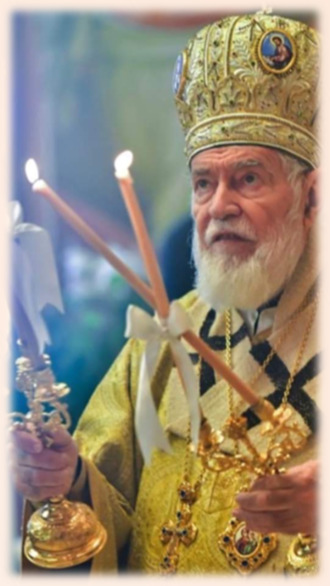
Archbishop Nathaniel
Source: Solia – The Herald
Published in the Summer 2020 edition, pgs 3-4.
Holiday or Holy Day? What is in a “word?” In Canada, people take a “Holiday;” in the US, it’s a “Vacation.” For both, a “Holiday” is a “different day.” The origin of the English word, “Holiday,” is “Holy Day,” a day of sacred significance, a day of faith, a day when work was suspended in honor of a holy event.
In North America, there are “National Holidays” as well as other holidays based on some long-forgotten event. Canada and the US each has its own “Thanksgiving Day.” One is never quite sure, though, to whom one is giving thanks. It cannot be to “God,” because to which “god” is one to give thanks? Someone may say, “I’ll pray for you,” when what is meant is “I’ll reflect on your problem.” Even politicians might say: “We need to ‘pray’ for this”, but what they truly mean is that given time, matters will change. In the public realm, to “pray,” has a secular connotation of temporary “thoughtfulness.” An invocation to the Deity is very far from minds and hearts.
There are “Holy Day” observances that even overshadow some National Holidays, although the “holiness” is disfigured into “Holidays.” Among them, “Valentine’s Day,” actually “Saint Valentine’s feast day”; “Halloween” actually, “All Hallows’ Day” or “All Saints’ Day.” Not far behind are “Christmas,” actually “Christ’s Mass,” and “Easter” which is actually “Pascha,” or the “Resurrection of Christ.” Christian “Holy Days” are the basis for what became secular North American “Holidays.”
These were first faith-based and then became generally practiced in a secular setting; and more recently, are being “transfigured” into more acceptable and non-committal celebrations. For some reason (maybe the once large Irish population), Saint Patrick’s Day remains with the prefix “Saint,” at least for now, until some “public” outcry. I recall the attempts (continuing attempts) to un-name the many California cities whose names have a religious basis: “Los Angeles,” “Santa Monica,” etc, etc, etc.
The commercialization of “holy days,” is not the fault of shrewd entrepreneurs but of the shoppers. As I write, “Halloween” candy is at half-price; Thanksgiving dainties line the shelves, and Christmas trees are blinking in stores. Oops! Not “Christmas” trees, but “Holiday” trees! What was once, “Easter Break,” became “Spring Break”; and now, “Spring Holiday” is an expression that relegates the word “Easter” to the dust bin of the past. Holidays can only be Holy Days if the original reason for the celebration is known and honored by a faith community.
Christian celebrations are not “National Holidays.” They are placed on the turntable of choices along with every creed or celebration newly invented. We have been experiencing this morphing for generations. Although the reshaping of once external faith-celebrations in society is taking place, the original faith commitment must remain nestled in the heart and life of the believer.
North America, like Europe, is now “Cosmopolitan.” “Cosmos,” the Greek word for “universal” or all-embracing. My cell-phone calendar automatically informs me of holidays/holy days of many faiths and cultures ever “foreign” to my experience. This certainly reflects our present societies. The Romans had a “Pan-Theon,” a shrine where the government provided a niche for every deity under Roman rule; none was more “divine” than another. “Smart” rulers. The Jews, however, worshipped the “Unseen” G-D and kept aloof. It seems that Christians must follow this kind of “spiritual stubbornness!” Christians today must remind ourselves that whatever transformation takes place in our societies, we must simply continue to honor our “Holy Days” as we have for 2,000 years.
+ Archbishop NATHANIEL
The Romanian Orthodox Episcopate of America



